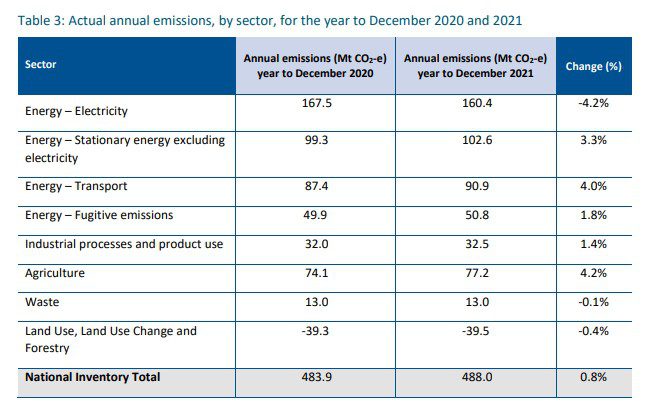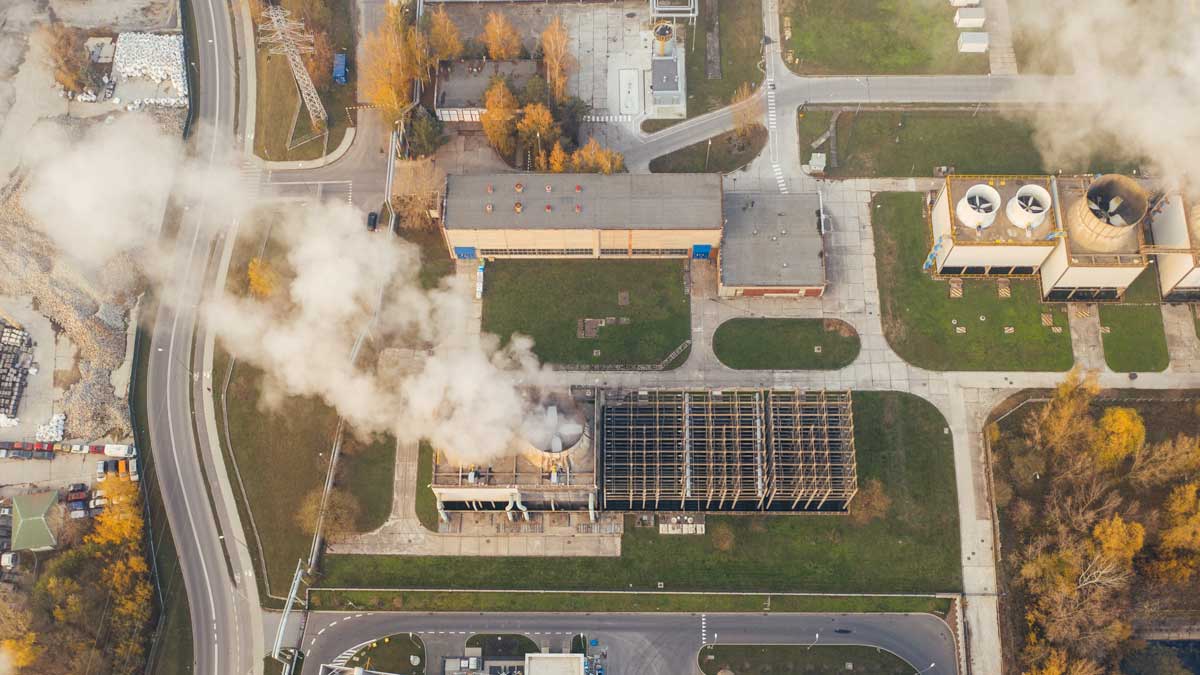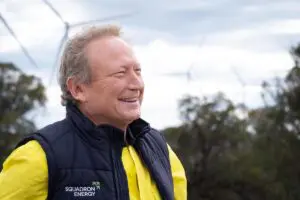Australia’s greenhouse gas emissions jumped in 2021 – growing by 4.1 million tonnes – as the economy began to return pre-Covid practices, leading the new Albanese government to slam the former Morrison government for squandering the chance for a long-term ‘green recovery’.
New data published by the Department of Industry, Science, Energy and Resources on Monday shows national greenhouse gas emissions grew by 0.8 per cent in 2021, driven higher by increased transport activity, fossil fuel production and a recovery in agricultural production.
Electricity generation was the only sector to record a significant decline in emissions last year, falling 4.2 per cent, as the growth of renewables continues to push fossil fuels out of the market. The electricity sector accounted for a 7.1 million tonne reduction in emissions during 2021.
But this improvement was more than wiped out by surging emissions across virtually every other economic sector.
Industrial energy use – which includes coal used in steelmaking, the processing of LNG for export and gas used in residential and commercial settings – jumped 3.3 per cent over the year.
Transport emissions increased grew by 4 per cent, as travel activity showed signs of returning to pre-Covid patterns after pandemic restrictions were lifted for most of the 12-month period and were driven higher by a 2.4 per cent increase in petrol consumption and a 5.4 per cent increase in diesel consumption.

Fugitive emissions – mostly methane that escapes during coal and gas extraction – increased by 1.8 per cent as fossil fuel production and processing increased.
The government’s data shows LNG production reached a new peak in the last three months of 2021, with 21.5 million tonnes produced in the quarter ending December 2021. Australia’s LNG production – which is almost entirely sent offshore – has more than tripled since 2015.
Agricultural emissions also recorded a massive 4.2 per cent increase last year as herd numbers recovered after being impacted by drought and flooding events
The waste sector recorded a slight decline in emissions – a fall of 0.1 per cent for the year – and a 0.4 per cent decline in emissions was reported for land use change and forestry – but each had a negligible impact on the overall emissions increase.
Federal climate change and energy minister, Chris Bowen, said the increase in emissions – which occurred under the former Morrison government – was the symptom of the previous government’s failure to implement effective emissions reduction policies.
“With the resumption of more normal economic activity, continuing recovery from drought and increases in manufacturing and resources sector activity, the previous Government caps off its record of denial and delay by increasing emissions on the way out,” Bowen said in a statement on Monday.
“It is the Albanese Government’s view that a global recession, pandemic, and drought are not economically desirable, nor sustainable ways to reduce national emissions.”
“Their failure to deliver proper climate policy over a decade undermines the great strides in emissions reduction made through household solar, the Renewable Energy Target and state-based renewable schemes in the electricity sector over recent years.”
Bowen said the new Albanese government had already locked in a higher 2030 emissions reduction target – to cut emissions by 43 per cent – and would work to implement new policies to drive long-term reductions in Australia’s emissions.
“Good climate and energy policy is good economic policy – it doesn’t rely on recession and drought for short term and temporary emissions reduction,” Bowen added.
Earlier in the month, REN21’s Renewables Global Status Report warned that the world had largely lost the “historic” opportunity to use Covid-19 recovery and stimulus spending to lock in long-term emissions reductions.
The REN21 report shows that most countries – including Australia – instead poured significant new subsidies to prop up fossil fuel industries during the pandemic, and that greenhouse gas emissions globally had increased during 2021 as oil, gas and coal use returned to their previous levels.
Senior campaigner at Greenpeace Australia Pacific, Lindsay Soutar, said greater government support for fuel efficiency standards and zero emissions transport could have helped achieve long-lasting emissions reductions.
“Ten years of negligence from the past government has seen transport emissions spiralling out of control. Tackling transport emissions needs to be a priority for this government,” Soutar said.
“They’ve already put in place some important new measures to support uptake of electric vehicles. The next step will be addressing the massive electric vehicle supply issues that are plaguing Australia, which has seen clean car waiting lists stretch out to over a year.”
“Policy measures such as a strong Fuel Efficiency Standard will do much to get Australia onto the clean transport track.”







